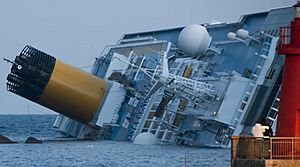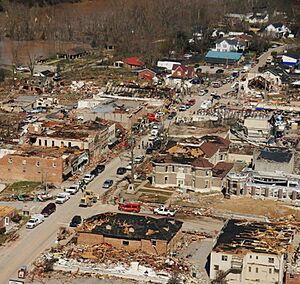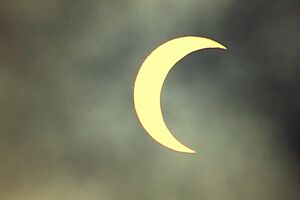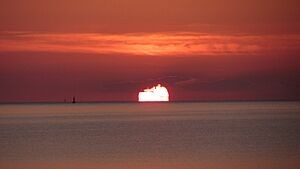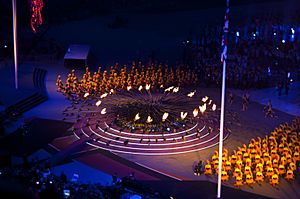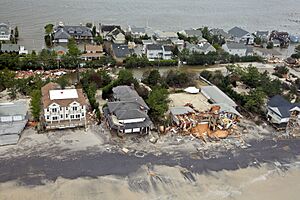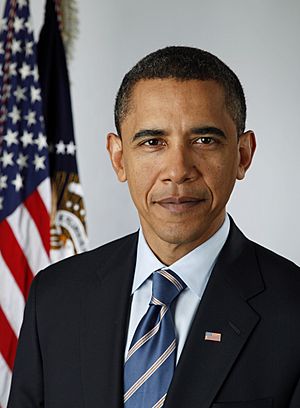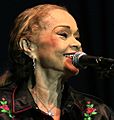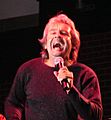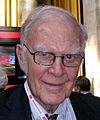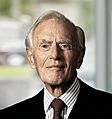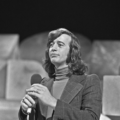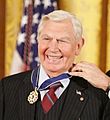2012 facts for kids
| Millennium: | 3rd millennium |
|---|---|
| Centuries: | 20th century – 21st century – 22nd century |
| Decades: | 1980s 1990s 2000s – 2010s – 2020s 2030s 2040s |
| Years: | 2009 2010 2011 – 2012 – 2013 2014 2015 |
2012 (also written as MMXII) was a leap year that began on a Sunday in the Gregorian calendar.
This year was special because it was called the International Year of Cooperatives. It was also known as the Alan Turing Year, honoring the famous computer scientist.
Contents
- Events of 2012
- January: A New Year Begins
- February: Changes and Challenges
- March: Disasters and New Leaders
- April: Political Shifts and Space
- May: Art, Elections, and Nature
- June: Royal Celebrations and Sports
- July: Olympics and Discoveries
- August: Mars, Olympics End, and Mining
- September: Earthquakes and Diplomacy
- October: Nobel Prize and Hurricanes
- November: US Election and Space Events
- December: Global Events and Milestones
- Important People Who Passed Away
- Nobel Prizes
- Images for kids
- See also
Events of 2012
January: A New Year Begins
- January 1 – Denmark started its turn as the leader of the European Union.
- January 5 – Portia Simpson-Miller became the Prime Minister of Jamaica for the second time.
- January 6 – New Mexico celebrated its 100th birthday as a US state.
- January 10 – The Doomsday Clock was moved to five minutes before midnight. This was due to concerns about nuclear threats and the Fukushima nuclear accident in Japan in 2011.
- January 13–22 – The very first Winter Youth Olympics were held in Innsbruck, Austria.
- January 14 – The cruise ship Costa Concordia crashed and partly sank off the Tuscan coast of Giglio island. Sadly, at least 30 people died out of over 4,000 on board.
- January 18 – The English language Wikipedia website went offline for 24 hours. This was a protest against new internet laws proposed in the United States Congress.
- January 23 – The EU decided to stop buying oil from Iran. This was because of Iran's work on uranium enrichment.
- January 30 – Very cold weather hit Europe, causing several deaths due to low temperatures.
- January 31 – 433 Eros, a large Near Earth Object, passed by Earth. NASA had studied this space rock with a probe called NEAR Shoemaker.
February: Changes and Challenges
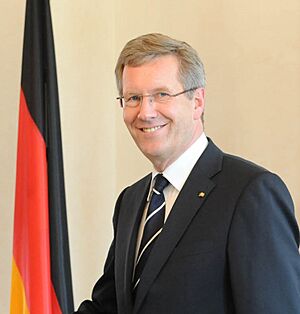
German President Christian Wulff who resigned in February.
- February 2 – The ferry MV Rabaul Queen sank near Papua New Guinea. At least 230 people were saved, but many were missing.
- February 6 – Queen Elizabeth II celebrated her Diamond Jubilee. This marked 60 years since she became Queen of the United Kingdom and other Commonwealth countries.
- February 7 – President Mohamed Nasheed of the Maldives announced he was stepping down. Mohammed Waheed Hassan took his place.
- February 11 – American singer and actress Whitney Houston was found dead in her hotel in Los Angeles.
- February 12 – The Zambia national football team won the Africa Cup of Nations, beating the Ivory Coast team.
- February 15 – A terrible fire at a prison in Honduras killed at least 357 people.
- February 17 – President of Germany Christian Wulff resigned because of a home-loan issue. He was the shortest-serving President in Germany's history.
- February 19 – Iran stopped selling oil to France and the United Kingdom. This happened after the EU and the United States put sanctions on Iran.
- February 21 – EU finance ministers agreed to give Greece a large loan of 130 billion Euros to help its economy.
- February 25 – Abdrabbuh Mansur Hadi became the new President of Yemen, taking over from Ali Abdullah Saleh.
March: Disasters and New Leaders
- March 2 – A series of tornadoes in Alabama, Kentucky, Ohio, and Indiana caused 39 deaths.
- March 4 – Explosions at a munitions dump in Brazzaville, Republic of the Congo, killed over 250 people.
- March 4 – Vladimir Putin won the Russian Presidential Election, becoming President again.
- March 13 – It was announced that the Encyclopedia Britannica would stop printing paper copies. After 244 years, it would focus only on its online version.
- March 13 – A coach crash in Switzerland killed 28 people, including 22 children from Belgium.
- March 18 – Joachim Gauck was chosen to be the new President of Germany, replacing Christian Wulff.
- March 22 – Ahmed Toumani Toure, the President of Mali, was removed from power in a coup by armed soldiers.
- March 25 – Macky Sall was elected President of Senegal, taking over from Abdoulaye Wade.
April: Political Shifts and Space
- April 1 – Aung San Suu Kyi won a seat in the Burmese parliament.
- April 2 – President Pal Schmitt of Hungary resigned after a plagiarism scandal.
- April 5 – President Bingu wa Mutharika of Malawi died. Joyce Banda became the new President.
- April 6 – A group called the National Movement for the Liberation of Azawad declared an independent state, Azawad, in northern Mali. However, no other countries recognized it.
- April 11 – Two strong earthquakes happened off the Indian Ocean coast of Sumatra. This caused panic and tsunami warnings across the Indian Ocean.
- April 12 – A coup happened in Guinea-Bissau. Soldiers arrested the interim President and a presidential candidate, taking control of the capital, Bissau.
- April 13 – Kwangmyongsong-3, a North Korean earth observation satellite, exploded soon after it was launched.
- April 16 – The trial of Anders Behring Breivik, who carried out the 2011 Norway attacks, began in Oslo.
- April 22 – Francois Hollande and Nicolas Sarkozy moved on to the second round of the French Presidential election.
- April 26 – Former President of Liberia Charles Taylor was found guilty of war crimes during the Sierra Leone Civil War.
May: Art, Elections, and Nature
- May 2 – Edvard Munch's famous painting, The Scream, was sold for 120 million US dollars. This was a record price for a work of art sold at auction.
- May 6 – Francois Hollande was elected President of France, beating Nicolas Sarkozy.
- May 6 – The Parliamentary election in Greece did not have a clear winner, so another election was planned for June 17.
- May 7 – Vladimir Putin became President of Russia for the second time. Dmitry Medvedev became the Prime Minister.
- May 12 – The 2012 World Expo started in Yeosu, South Korea, lasting until August 12.
- May 15 – Francois Hollande officially became President of France.
- May 18-20 – The G8 Summit, a meeting of leaders from major countries, was held at Camp David in the United States.
- May 20 – Taur Matan Ruak became President of East Timor.
- May 20-21 – The first NATO Summit in the United States outside of Washington, D.C., was held in Chicago, Illinois.
- May 20 – A magnitude 6 earthquake hit northern Italy, killing at least 7 people and damaging many old buildings.
- May 20 – An annular solar eclipse was visible across the Pacific Ocean, from East Asia to the Western and Midwestern United States.
- May 22 – The Tokyo Skytree in Tokyo, Japan, opened to the public. It is the tallest self-supporting tower in the world, standing 634 meters tall.
- May 26 – The final of the Eurovision Song Contest 2012 took place in Baku, Azerbaijan. Loreen from Sweden won the contest.
- May 29 – Mitt Romney officially became the Republican Party candidate for President of the United States.
June: Royal Celebrations and Sports
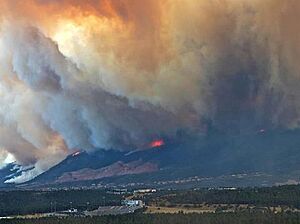
Devastating wildfires in Colorado.
- June 2 – Former President of Egypt Hosni Mubarak was sent to prison. This was for ordering the killing of protesters during the 2011 Egyptian protests.
- June 2-5 – Celebrations happened across the UK and Commonwealth countries. This was to mark Queen Elizabeth II's 60 years on the throne.
- June 3 – A Dana Air Flight crashed into a building in Lagos, Nigeria. All 153 people on board died, along with 40 people on the ground.
- June 4 – A partial lunar eclipse occurred.
- June 6 – The second and last solar transit of Venus of the century happened. The next one is expected in 2117.
- June 8-July 1 – The UEFA Euro 2012 football tournament was played in Poland and Ukraine. The Spain national football team won.
- June 9 – Large wildfires started in Colorado.
- June 17 – Another Parliamentary election was held in Greece, the second in six weeks.
- June 17 – The final round of Egypt's Presidential election took place.
- June 18-June 23 – The Turing Centenary Conference was held at the University of Cambridge. It honored Alan Turing, a famous mathematician and computer scientist, on his 100th birthday.
- June 20 – Antonis Samaras became the new Prime Minister of Greece.
- June 22 – President Fernando Lugo of Paraguay was removed from office by impeachment. Federico Franco took his place.
- June 24 – Shenzhou 9, a Chinese spacecraft with three Chinese astronauts (including the first female Chinese astronaut), manually docked with the orbiting module Tiangong 1. China became the third country to do this successfully.
- June 24 – Mohamed Morsi of the Muslim Brotherhood was announced as the winner of Egypt's Presidential election.
- June 28 – The United States Supreme Court ruled that Barack Obama's healthcare reform plan was constitutional.
- June 30 – Mohamed Morsi was sworn in as President of Egypt.
- June 30 – Iceland's Presidential election was held, and the current President, Olafur Ragnar Grimsson, won again.
- June 30 – An extra leap second was added at the end of the month.
July: Olympics and Discoveries
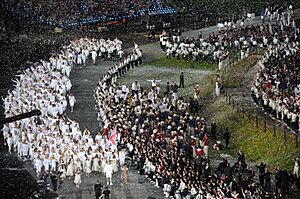
Cyclist Chris Hoy leading the Great Britain team at the opening ceremony of the 2012 Summer Olympics in London.
- July 1 – Cyprus began its turn as the leader of the European Union.
- July 1 – The Presidential election in Mexico was won by Enrique Pena Nieto.
- July 4 – Scientists at CERN announced they had found a particle that matched the properties of the Higgs boson. This discovery was made after experiments at the Large Hadron Collider.
- July 7 – Flooding in the Krasnodar Krai region of southern Russia killed 72 people.
- July 13 – FIFA faced another corruption scandal. Sepp Blatter suggested there might have been problems when Germany won the right to host the 2006 FIFA World Cup.
- July 18–21 – The 2012 World Rowing Championships were held in Plovdiv, Bulgaria.
- July 24 – John Atta Mills, President of Ghana, died while still in office. John Dramani Mahama took over until the election in December.
- July 25 – Pranab Mukherjee became President of India, taking over from Pratibha Patil.
- July 27 – The opening ceremony of the 2012 Summer Olympics began in London.
- July 29 – In Romania, a vote was held on whether President Traian Basescu should be removed from office. He stayed in his position because not enough people voted.
- July 30/31 – Large parts of northern and eastern India experienced massive power failures. Over 600 million people were left without electricity.
August: Mars, Olympics End, and Mining
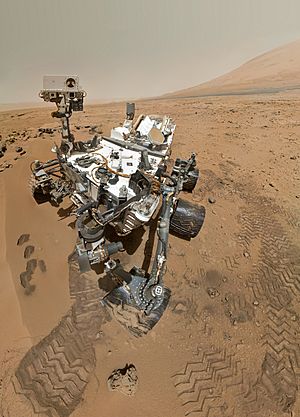
The Curiosity rover landing on Mars.
- Early August – Typhoon Haikui caused flooding in the Philippines.
- August 6 – Curiosity, the Mars Science Laboratory mission's rover, successfully landed on the planet Mars.
- August 11 – Two earthquakes over magnitude 6, followed by many smaller ones, hit the area around Tabriz in northwestern Iran. Over 300 people died.
- August 11 – US Presidential candidate Mitt Romney chose Wisconsin Congressman Paul Ryan as his running mate.
- August 11 – The Jamaican men's 4 by 100 meter team won the gold medal at the 2012 Summer Olympics. This meant Usain Bolt successfully defended all three titles he won in Beijing in 2008.
- August 12 – The closing ceremony of the 2012 Summer Olympics in London took place. Host nation Great Britain finished with the third-highest gold medal count.
- August 16 – Police opened fire on striking miners at the Marikana mine in South Africa, killing 34 people.
- August 22 – It was decided that the attempt to remove Romania's President Traian Basescu in a vote was not legal.
- August 24 – Cyclist Lance Armstrong announced he would no longer fight against claims of using banned substances. The World Anti-Doping Agency took away his seven consecutive Tour de France titles.
- August 24 – A court in Oslo ruled that Anders Behring Breivik was sane. He was sentenced to a 21-year prison sentence for the 2011 Norway attacks.
- August 29 – The 2012 Summer Paralympics began in London.
- August 31 – Researchers announced they had successfully put in an early version of a bionic eye.
- August 31 – Armenia ended its diplomatic ties with Hungary. This happened after an Azerbaijani man was sent back to his home country and then pardoned.
September: Earthquakes and Diplomacy
- September 7 – Two earthquakes in southern China killed at least 80 people.
- September 7 – Canada ended its diplomatic relations with Iran. This was due to Iran's stance on Syria, its nuclear program, and its human rights record.
- September 9 – The 2012 Summer Paralympics ended.
- September 11 – The US embassies in Cairo, Egypt, and Benghazi, Libya, were attacked. These attacks killed U.S. Ambassador to Libya Christopher Stevens and three other people. It was later thought to be a coordinated terrorist attack.
- September 27 – Flooding affected parts of southern Spain.
- September 28 – A plane crashed shortly after taking off from Kathmandu, Nepal, and caught fire. All 19 people on board, who were going to Mount Everest Base Camp, died.
- September 30 – Europe won the Ryder Cup golf tournament against the United States, making a big comeback to win.
October: Nobel Prize and Hurricanes
- October 1 – A ferry accident in Hong Kong killed 38 people.
- October 3 – A bomb attack, believed to be connected to the Syrian conflict, happened on the border with Turkey.
- October 12 – The European Union won the Nobel Peace Prize.
- October 14 – Austrian skydiver Felix Baumgartner became the first person to break the sound barrier without mechanical help. He did this during a record space dive from a helium balloon 24 miles (39 kilometres) above Roswell, New Mexico, United States.
- October 15 – British Prime Minister David Cameron and Scottish First Minister Alex Salmond signed an agreement in Edinburgh, Scotland. This agreement set the terms for a vote on Scottish independence, planned for 2014.
- October 19 – A bomb attack in Beirut, Lebanon, killed 11 people, including the Lebanese army chief. This attack was also thought to be linked to the conflict in neighboring Syria.
- October 24 – Ireland stopped its old analog television broadcasts.
- October 24-30 – Hurricane Sandy killed over 200 people in several countries, including Jamaica, Haiti, Cuba, the Bahamas, the Eastern United States, and parts of Canada. It was the biggest North Atlantic Hurricane ever measured by its size. It caused a lot of damage from storm surges on the eastern coast of the United States.
- October 26 – Silvio Berlusconi was found guilty of tax fraud.
- October 30 – Hurricane Sandy ended.
November: US Election and Space Events
- November 3 – The New York City Marathon was canceled for the first time in 42 years due to Hurricane Sandy.
- November 4 – Bishop Tawadros was elected the next Pope of the Coptic Church in Egypt.
- November 6 – United States presidential election, 2012: Barack Obama won re-election as President against Mitt Romney.
- November 6 – A vote was held in Puerto Rico about its future. Most people wanted a change, and most of those voted for Puerto Rico to become the 51st US State.
- November 6 – In votes held in the US States of Maine, Maryland, and Washington, most voters supported allowing same-sex marriage.
- November 10 – Four days after the United States presidential election, 2012, Barack Obama secured the state of Florida, completing his win.
- November 13 – A total solar eclipse was visible in northern Australia and the South Pacific.
- November 14 – Israel launched Operation Pillar of Defense against Palestinians in the Gaza Strip, killing Hamas military chief Ahmed Jabari. Fighting over the next week killed 133 Palestinians and 5 Israelis.
- November 15 – The Communist Party of China introduced Xi Jinping as its next General Secretary. He was expected to lead the People's Republic of China until 2022.
- November 21 – After a week of violence in Israel and the Gaza Strip, the United States and Egypt announced a ceasefire, ending the week-long conflict.
- November 25 – A fire in a clothing factory in Dhaka, Bangladesh, killed over 100 people.
- November 25 – Regional elections were held in Catalonia, with the main topic being possible future independence from Spain.
- November 25 – Sebastian Vettel won the Formula One World Championship for the third year in a row. He became the youngest driver to win three Formula One championships.
- November 25 to December 2 – Typhoon Bopha, also known as "Pablo" in the Philippines, killed at least 1,020 people and left 844 missing. It caused a lot of damage on the island of Mindanao.
- November 28 – A penumbral lunar eclipse occurred.
- November 29 – At the UN General Assembly, most member states voted to give Palestine non-member observer state status.
December: Global Events and Milestones
- December 1 – Enrique Pena Nieto became President of Mexico.
- December 3 – Jupiter was in opposition, meaning it was directly opposite the Sun in the sky as seen from Earth.
- December 8 – In Qatar, at the UN Climate Conference, it was agreed that the Kyoto Protocol would be extended until 2020.
- December 12 – North Korea announced that it had successfully launched a rocket.
- December 15 – Egypt held a vote on its new constitution.
- December 16 – Parliamentary election in Japan: The Liberal Democratic Party of Japan, led by Shinzo Abe, won the election.
- December 17 – Members of the Electoral College met in each U.S. state.
- December 19 – Park Geunhye was elected President of South Korea. She became the country's first female leader in February 2013.
- December 21 – This was the Winter Solstice in the Northern Hemisphere and the Summer Solstice in the Southern Hemisphere.
- December 21 – The Mesoamerican Long Count calendar, used by the ancient Maya civilization, completed a "great cycle." Some people mistakenly believed this meant the end of the world.
- December 21 – Barack Obama nominated John Kerry to become United States Secretary of State, taking over from Hillary Clinton.
- December 26 – Shinzo Abe became Prime Minister of Japan for the second time.
- December 28 – At 115 years and 253 days old, Jiroemon Kimura of Japan became the oldest man ever recorded.
- December 31 – Politicians in the United States held last-minute talks to try and avoid the "Fiscal Cliff." This was a series of tax increases that would start in the new year.
Important People Who Passed Away
Nobel Prizes
- Physiology or Medicine: John Gurdon and Shinya Yamanaka
- Physics: Serge Haroche and David J. Wineland
- Chemistry: Robert Lefkowitz and Brian Kobilka
- Literature: Mo Yan
- Peace: European Union
- Economics: Alvin E. Roth and Lloyd Shapley
Images for kids
-
The discovery of Higgs boson particles was announced based on collisions in the Large Hadron Collider at CERN.
See also
 In Spanish: 2012 para niños
In Spanish: 2012 para niños
Black History Month on Kiddle
Famous African-American Scientists:
 | Percy Lavon Julian |
 | Katherine Johnson |
 | George Washington Carver |
 | Annie Easley |

All content from Kiddle encyclopedia articles (including the article images and facts) can be freely used under Attribution-ShareAlike license, unless stated otherwise. Cite this article:
2012 Facts for Kids. Kiddle Encyclopedia.

